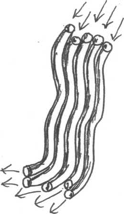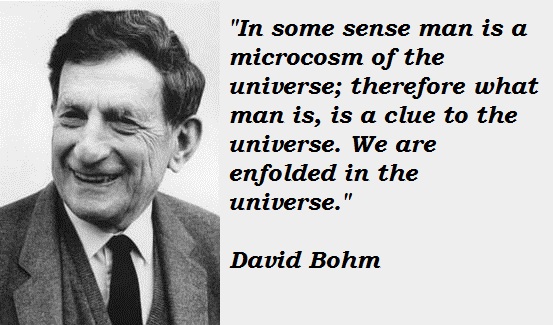Bohm Medallions
|
The Ultimate Proprietor
|
I say: my country; I say: my people,
but they are just mine, they are not me. I say: my garden; I say: my home; I say: my friends; I say: my family, but they are just mine, they are not me. I say: my eyes, my ears, my skin, my lungs, my kidney, my brain, my heart, my flesh, my bones, my blood, my nerves, but they are just mine, they are not me. I say: my consciousness; I say: my dreams, my memories, my plans, my talents, my daydreams, my art, my philosophy, my humour, my mind, my body, my soul, my spirit, my self, but they are just mine, they are not me. Where is the wise man of whom I can ask: beyond the properties, which are all mine where is the ultimate proprietor: the I who hides behind "my I"? |
(Once upon a time, there was a poor man
who set out on a great journey, lasting for months, to meet the Wise Man of a distant region and ask him how to break out of his misery. The Wise Man told him: "Go home to your little hut, take your little shovel, and dig below your little bed." The poor man went home to his little hut, took his little shovel, dug under his little bed and he found a little box full of gold and diamonds. He had spent his whole life near his treasure, but he hadn't been aware of it. Therefore, it would be wrong to say that his long journey had been futile.) |
One Wise Man who points to the treasure that's right there: the ultimate proprietor
InfinitelySince the universe is infinitely large,
I am infinitely small. Since the atom is infinitely small, I am infinitely large. I am infinitely confused about my size, but one thing I know for sure: I am the center of all things. Just like the universe. Just like the atom. RingThat I am
is more than to know that I am |
TrinityHere I am sitting
with the borderline of my skin separating the unknown surrounding me from the unknown contained in me, here I am sitting, I, the unknown. KnowingThe Ether, the Air, the Water, the Fire,
the Earth, the Crystals, the Plants, the Animals don't know that they don't know. Only I, Homo Sapiens, know that I don't know. |
CirculationsThe flame is extinguished
but the fire keeps burning The drop dissolves but the ocean keeps undulating The bubble bursts but the wind keeps blowing The leaf falls but the tree keeps growing Why do I fear death? |
Zen(d) master Thich Nhat Hahn with his own version of circulations |
Anti-Uni-Verse1.
In the hollows of our cavernous universe invisibly hides another cavernous universe in the hollows of which our universe hides invisibly 2. “Let's hope that we are invisible for those whom we cannot see” 3. I caught these words while they were passing through me ProblemsThe first problem: How large is outer space?
Infinite? Our mind invented, but doesn’t understand this word. Finite? Then what is beyond it? The second problem: If matter is divisible, how far can it be divided? Infinitely? How far is that? Or is there an indivisible building block? And if we blew up that block to the size of a cosmos, what would it contain? Would it be empty? The cosmos cannot be empty! So what would it be full of? The third problem: How long is time? If it began once and will end once, what preceeded it and what will follow it? If it has always been and will never end, then how is it possible? The fourth problem is that if the mind’s role is to understand the world, then why doesn’t it and why won’t it ever be able to? But if understanding the world is not its role, then, on the one hand, what is its role, and, on the other, why is it burdened with the inextinguishable thirst to understand it? What use is science? The fifth problem is that if we don't know what our role is in a world whose role we don't know either, then we also don’t know what we live for, and even less, how we should live for what we live for. The sixth problem is that if we believe in God, then we don't only avoid answering these questions, but also raise new ones, like for instance: If God dwells outside the world, then where is that? And if that's no longer part of the world, then what is it? But if God is in everything in this world, then what’s the difference between God and this world? If it is possible to last forever, then why do we conceive of a temporary world created by an everlasting being? Had we conceived of an everlasting world, we wouldn't have needed to create a Creator! If God was born and will die, who preceded Him and who will come after Him? If the world is merely His body, then He may not even know about us, so why should we worship Him? Our cells do not worship us either just as we don't worship the Galaxy. If, prior to creation, He planned everything out, then why do we strive? If He expects us to be good, then why does He allow Evil to proliferate? If He lets us chose freely, then He is superfluous. This God-concept is, really, very discombobulating: if it is merely a creation of our mind, then it is like the labyrinth, built solely for the purpose of getting lost in. The seventh problem is that if we brush aside all these questions, declaring that they are not important and that we should just go ahead and live life as it comes without believing either in a God or a purpose, or in free will, or predestination, or in good and evil, then we degrade ourselves to the level of animals, of plants, or even of minerals - dumb , lifeless matter unaware of its own existence. Is this why we struggled to become human? What was our whole bloody history good for? The eighth problem is that if living is good and therefore dying is bad, then living is bad because dying is inevitable. But if living is bad, then dying is good. And if dying is good, then living is good too. So then, what's the good and what's the bad between which we have to chose, and is there any way out? The ninth problem is that if there is a way out and life is just a dream from which our death will awaken us, then what would the problems he in a life after death? If there are problems even there, then it's not worthwhile even to die! But if there are no problems there, only the music of the spheres, which we would have to listen to forever, then that would be utterly boring, therefore a new problem arises, namely: How is it possible to bear a life without problems forever? But if that life also has an end, then why should we even start it? As far as that goes, why did we have to start this present life, a life equally unbearable because of its problems? On the other hand, if instead of the world, there would be nothing, then we would not be either, in which case we would have no way of knowing that that nothing is better than this something. But something cannot arise out of nothing, and something cannot turn into nothing, Therefore there is no such thing as nothing: again, it’s just a word invented by our mind to describe absence, although in the real world there are only presences. The tenth problem is: Where can I get money to pay the telephone bill tomorrow? An Essay on the Nature of Man
Man is composed of 5 macaronis
intertwined as a braid. The first is for liquid, the second for solid, the third for gaseous, the fourth for intellectual, and the fifth, for sexual stuff. The top hole of the macaronis serve for getting hold of the Input. (Drink, Food, Air, Culture, Excitement.) The bottom hole of the macaronis serve for getting rid of the Output. (Number One, Number Two, Number Three, Creation, Children.) The fuller and faster the traffic through the bundle of macaronis is, the happier Man is. - January 12 1982 |
BuildingOn the seventh floor of my mind I know
that thinking is useless speaking is worthless loving is hopeless writing is fruitless and fearing death is senseless but most of the time I live on the main floor Mind under MatterThe Mind cannot understand the world, therefore
the Mind is a mystery. The World is not a mystery because it doesn't understand the World, but it doesn't mind. The mystery is why the mind minds that it doesn't understand the world. The Mind is a question without an answer. The World is an answer without a question. The Mind invented the idea of both the question and the answer. The World is both and neither question and answer. The Mind is the "why?" The World is the "just because." God and IThere is a free verse written
in Unispace, Unitime: God is a Universifier whose poem does not rhyme. My verse takes a minute to read and it's small as a pie because - alas! - I am no God and therefore I shall die. Tell me, what is better to be: immortal and immense with no sense? Or to be mortal and make rhythm, rhyme, sense? - December 6 1981 I am the legendary onion
who after peeling off its layers searched for its self and found it in the scent dissipating In other moments, the world
seems to be an incoherent mosaic The mind on the edge is just another tile which thinks that it is in the centre and everything else is as square as itself The structure of infinity is
that millions are contained in one that one is contained among millions and their overlapping selves devour one another to resurrect A spiral of black stars revolve
in a white space embroidered with silence yellow pearls explode, but the memory of the future is eavesdropping On a bicycle composed of moss
rides a girl composed of sunshine She smokes an ether-cigarette and thinks about a long-forgotten purple orgasm One of the friends is sinuous, shimmering;
the other is full of swarming chaos, they walk side by side under the ocean among the ruins of a former world age In a forest of people
two trees make love Black letters say:
"Let there be light!" - February 26 1984 Three Discoveries1. No one can choose
his parents 2. No one can choose his children 3. No one can choose himself - January 10, 1971 |


